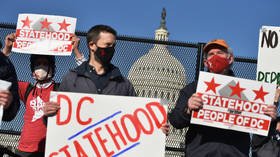House votes to make DC a state, Republicans call bill a Democrat ‘power grab’

Backed by President Biden, the House has passed a bill that would make Washington, DC, a state, and with it lock down the Democratic Party’s control of Congress. However, the bill faces an uphill battle in the Senate.
The Democrat-controlled House of Representatives voted on Thursday to pass HR. 51, a bill that would see the State of Washington, Douglass Commonwealth, become the 51st US State and the newest state admitted to the union since Hawaii in 1959. The bill passed on a party-lines vote of 216-208.
Some activists in the District of Columbia have pushed for statehood for a long time, but their cause was generally regarded as a fringe one, especially as the US Constitution requires that the nation’s capital be located in a federal district, under the direct control of Congress and separate from any other state. To get around this, HR. 51 proposes shrinking the federal district to a tiny sliver of land encompassing the White House, Supreme Court and Capitol.
Also on rt.com Biden endorses Democrat proposal to make Washington, DC the 51st US stateThe statehood cause now has the support of the Biden administration, which released a statement on Wednesday decrying the current situation as a “denial of self-governance” for the district’s 700,000-plus residents, and claiming that statehood would “make our Union stronger and more just.”
Passing the bill, House Speaker Nancy Pelosi (D-California) said it would “finally address this unjust, unequal and undemocratic situation.” Republicans, on the other hand, decried the bill as a “power grab,” in the words of Minority Leader Kevin McCarthy.
“Democrats can’t pass their radical agenda through Congress, so they are trying to pack the court and make DC a state,” Colorado Rep. Ken Buck (R) tweeted on Thursday.
The Democrats’ D.C. statehood scheme is about two things: consolidating power and enacting radical policies. The American people see right through this blatant power grab.
— Kevin McCarthy (@GOPLeader) April 22, 2021
Democrats can’t pass their radical agenda through Congress, so they are trying to pack the court and make DC a state. pic.twitter.com/gMoDDENTeH
— Congressman Ken Buck (@RepKenBuck) April 22, 2021
D.C. residents pay more federal taxes than 21 states, have a larger budget than 12 states & have a population larger than two states. The House will pass the Washington, D.C. Admission Act so residents will be closer to gaining the rights that they are fighting for and deserve. pic.twitter.com/OWEQcKRsRu
— Nancy Pelosi (@SpeakerPelosi) April 22, 2021
For Democrats, there are distinct political advantages to statehood. For one, the new state would get two seats in the Senate, and these seats would almost certainly be filled by Democrats. The prospective state’s three electoral votes would also be a lock-in, given that the District has never in its history voted for a Republican presidential candidate.
Standing in the way, however, is the Senate. Democrats hold a single-seat majority there, once Vice President Kamala Harris’ tie breaking vote is taken into account. However, admitting DC to the union would require a 60-vote majority, unless the Democrats were to eliminate the upper chamber’s filibuster rules.
And standing in the way of both statehood and filibuster reform is Senator Joe Manchin of West Virginia. A Democrat representing a solidly Republican state, Manchin has repeatedly spoken out against ending the filibuster, and is unlikely to vote for statehood. Without Manchin, the Democrats lose their Senate majority, and Manchin will be in office until at least next November. Arizona’s Kyrsten Sinema also supports the filibuster and is not a surefire vote for DC statehood.
Also on rt.com Biden once described packing the Supreme Court as a ‘bonehead idea… a terrible mistake.’ So, why’s his party doing it now?Energized by their return to power, the Democrats are unlikely to be deterred, and HR. 51 also includes other partisan measures that were written off as Republican fear mongering prior to Biden’s election. One addition would federalize election rules, while a proposal in Congress seeks to expand the US Supreme Court to 13 justices – presumably so its current 6:3 ratio in favor of ‘conservative’ judges would be flipped to 7:6 the other way. The Biden administration has not openly supported the proposal, but Biden recently signed an executive order aimed at reevaluating the “membership and size” of the court.
Like this story? Share it with a friend!














